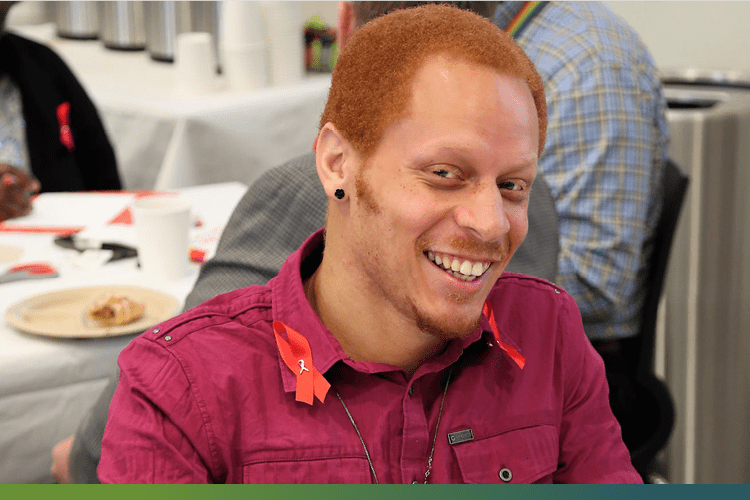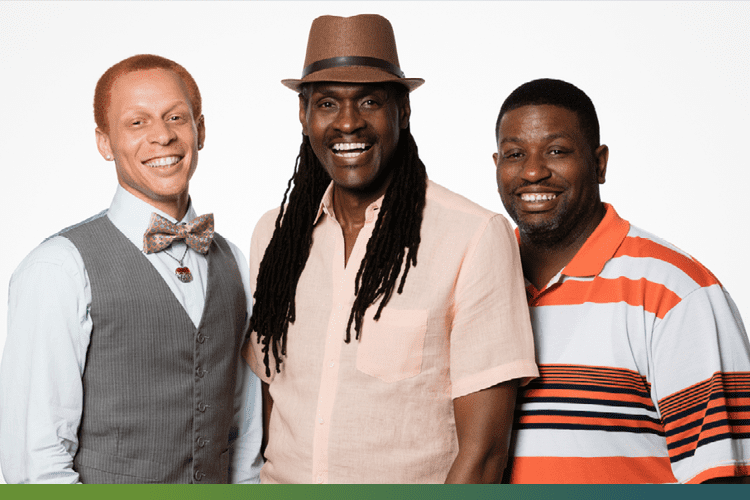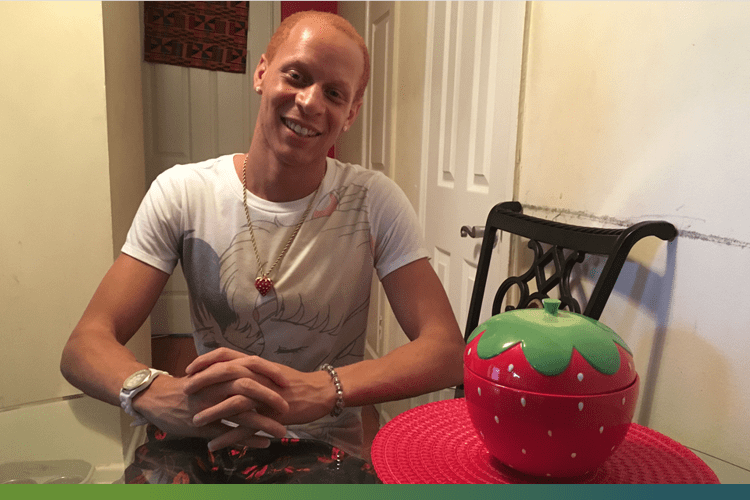Derrick “Strawberry” Cox, Spreading Joy & Love to My Community
As part of Whitman-Walker 40th anniversary, officially January 13, 2018, we’re sharing 40 stories to help tell the narrative of the Whitman-Walker community. We’d like to introduce you to Derrick Cox, affectionately known as Strawberry. An actor, model, dancer and activist in DC, Strawberry enjoys spreading as much great energy as he can. A native Washingtonian, Strawberry shares his story of being positive in the age of one-pill-a-day HIV treatment.
Click the orange play button below to hear Strawberry’s 2017 oral history – a recorded interview with an individual having personal knowledge of past events.
Five Quotes from Strawberry’s Oral History
On the Impact TV Had on Him:
“…TV raised me. So, since I was already, I guess, as they say ‘feminine,’ or whatever the case was, I just did what it… because I have a lot of females in my family. So, I just did what I seen my aunts and my grandmother and them do. So, you know, they did the cooking, the cleaning. My family did hair, so it was just like everything I saw them do, I decided to learn how to do also. And then that kind of helped out with raising my brother and then my cousins, doing their hair, making sure they took a bath, make sure they did their homework, cooking for them. So, it became like an actuality thing. So, in my mind, I was just like TV like Lifetime, Logo. Just like all these movies where the mother figure took care of everything, because the father was always out there working. So, since my mother was always out at work, I was like, ‘Well then, I´m going to take on that mother role.’ And so, my goal in life was the be, you know, the perfect housewife type situation. So, TV taught me how to do the basics of what I needed to do.”


On His Introduction to HIV:
“Well so, going into middle school, we had a sex-ed class. That’s where I initially learned about all the STDs and HIV. And, I learnt that all the STDs some of them was curable, but some of them can cure, but they can come back, so you have to know, retreat yourself. But then the whole HIV situation, they made it seem like that was the ‘Aaah! Like if you get this, you´re dead. So, protected sex is a must, because once you get this, it´s over for you.’ And it was real funny, because it was just like you hear what people used to say back in the day, as far as what you used to say. And I always told myself, I was like uh-uh, if I ever get HIV, I´m just going to go to jail. Yeah, I’m just going to let them have their way with me, because if I´m going to die, then most of them will die anyway. Anyway, they are in jail, so I might as well help the cause. So that was my theory on it. I just said it, because you know I figured I would never be in this situation because I had this huge love for myself, and my body. And I was like so careful and overprotective. So, I was just like, ‘I´m good. I ain’t never worrying about it.’ Fool me!”
On His Introduction to Whitman-Walker’s Max Robinson Center:
“I just Googled ‘gay doctors.’ Like I was like, okay. So, I wanted to go to… because I was like I want to have one of my own doctors. So, I was like not necessarily my doctor didn’t have to be gay, I just wanted to go to a place where gay people go to. And I was just like, gay doctor and whatever. You know, like I was Googling places, and I was like gay doctor, gay places. I wasn’t getting the wording right, because you know a lot of porn and stripper stuff was coming up. And I was like, ‘okay.’ I had to finally put in, I was like okay, I was like ‘prescriptions for gay clients’ and stuff like that. So, I was just like making up stuff. And then Max Robinson came up, and then I saw… I didn’t see a rainbow. But I saw the, it was like red, green, red, yellow, green, blue. I was like, well that’s four colors. That’s enough for me. I’ll check it out. So, I went to Max Robinson, and then that’s where I met Adisa. And he had this wonderful personality.”


On Learning about the Stigma Around Whitman-Walker and HIV Clinics:
“But when I initially wanted to go there, what I heard about it was it was just a place for people with HIV, or whatever the case was. And at the time, I didn’t have it yet. So, it was just like, ‘Well I don’t have HIV, but I´m going to go see my doctor.’ So, I was just like, you know I ain’t got nothing to do with that part. So, I went there, and when I went there, it was very welcoming. Like literally everyone spoke to the people behind the counter, to the people sitting in the waiting room. And like the nurse that came out, she came out with such a big smile on her face. And when she was calling people names, so it was just like they made them feel welcome.
Like when I heard that it was a place for people with HIV, I didn’t think too much of it. But then like along the way, then I started to figure out the like the bad stigma behind what people are saying about Whitman-Walker or Max Robinson, or any certain type of clinic.”


On Finding A Home in His HIV Support Group:
“HEPI stands for HIV Education and Peer Inspiration. It came to be one of those positive HIV groups, that people come together of all ages and stages and different backgrounds.
And they get to share their story, feel better about their story, or what happened, what they didn’t have control over, what they had control over, what they could have done, the decision they could have made better, or where they just stood at now with it. So, it was basically a support group for people living with HIV or AIDS. And it was there to help them understand that whatever happened, it happened. It doesn’t matter. And you living in this situation now, and as long as you accept your situation, that’s all you need to know from there. And you started to build yourself up from there. And it just goes to show that no matter what age, because you have people as young as I was in there as far as people closer to, I believe the oldest person in there was 72 years old. And everything still worked, arms and legs. And so, it was pretty amazing to see so many different people of different ages speak about their story, and how medicine wasn´t provided for them back in the day, especially a one pill regimen. You got some, he said he had to take I believe like 13 pills a day. And he was like it was hard to consume all that medicine, and not having enough food or not having money to pay for bills. It was just like to take care yourself in a healthy way, but then to still care of yourself and the responsible reality living way, it was just such a huge unbalance for a lot of people. And it’s still like that for some people today, except you´re not heavily medicated now. You still got that one pill, but you know you still got those stressful situations and that motivation that you want to keep in the back of your head. Like okay, well as long as I´m staying healthy then that´s more important than the job. Or if I can make it to work today or tonight, or if I can eat today or tomorrow.”